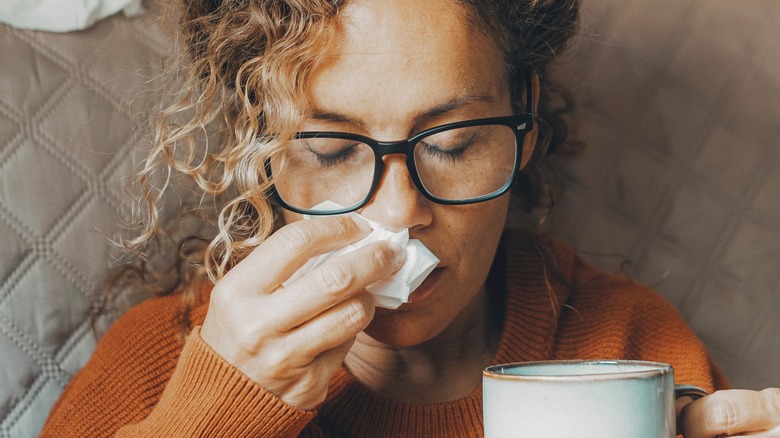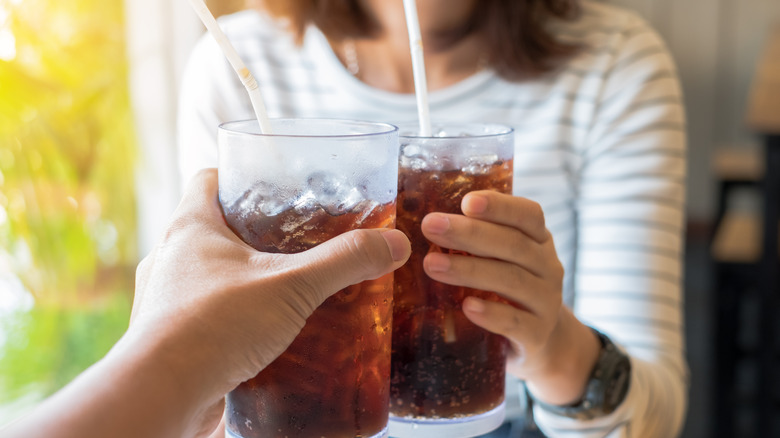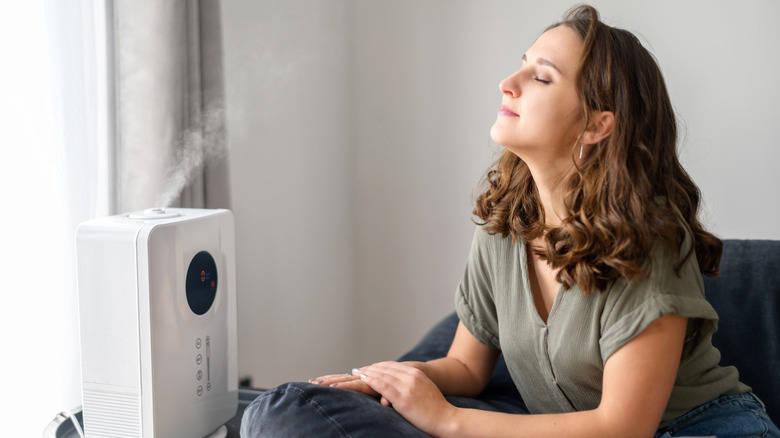The Beverages That Could Be Causing Your Nosebleeds
It doesn't take much to prompt a nosebleed. In fact, experts at Mount Sinai note that it often doesn't take more than a viral cold or minor irritation to set one off. Usually affecting only one nostril, a nosebleed may occur as a result of sneezing, exposure to overly dry or cold air, blowing one's nose too hard, or one too many sprays of a nasal decongestant product.
In other instances, a nosebleed may have a more serious cause, such as injury, snorting illicit drugs, or the result of a sinus or pituitary surgical procedure. Children are often more susceptible to nosebleeds than adults are, as the blood vessels within their nasal passages reside closer to the surface of the membrane lining, making them more prone to breakage (via Children's Health).
However, this doesn't mean that adults are immune to nosebleeds. Aside from illness or the frigid wintertime air, there are some other lesser-known factors that may increase one's risk for a nosebleed – including caffeinated beverages.
The role of caffeine in nosebleeds
As it turns out, tea, coffee, soda, energy drinks, and any other beverages rich in caffeine may potentially be contributing to your nosebleeds, according to Kaiser Permanente. The reason being is that caffeine can have a dehydrating effect on the body. As a diuretic, caffeine prompts the kidneys to increase urine output, causing the body to lose more fluid (via Healthline). By drying out the body, consumption of these beverages may make one more prone to nosebleeds.
However, some experts argue that a person's caffeine intake would have to be considerably high to place them at risk for dehydration. We're talking upwards of 500 milligrams daily — which comes out to approximately 5 cups of coffee. "Anyone who regularly consumes caffeinated coffee or tea will develop a tolerance, and a regular cup of coffee has no real significant effect on overall hydration status," registered dietitian Marie Spano tells Real Simple. Rather, experts at the Mayo Clinic point out that in addition to caffeine, caffeinated beverages also provide the body with fluids, thereby offsetting their diuretic effect. However, some caffeinated beverages are specifically noted to increase the risk for dehydration, such as energy drinks, according to the Centers for Disease Control and Prevention. Therefore, some caffeinated beverages may increase our risk for nosebleeds more so than others.
Help prevent nosebleeds by keeping nasal passages moist
If you or a loved one experiences a nosebleed, have them sit down and breathe through their mouth. Do not lay down or tilt your head backward, as this can cause blood to flow into the throat (via Cleveland Clinic). Using your thumb and index finger, hold the nostrils tightly shut to stop the bleeding. This can take anywhere from five to 10 minutes. Use of a cold compress, such as an ice pack, may also help slow the bleeding. If your nose continues to bleed after 15 to 20 minutes of applied pressure, seek emergency medical attention.
To prevent your nasal passages from drying out, inhale steam from a hot shower or a running faucet multiple times a day. Similarly, try utilizing saline nose drops or Vaseline ointment inside the nose between two and four times daily (via Kaiser Permanente). Running a humidifier can also help keep the air in your home moist. Lastly, if caffeinated beverages may potentially play a role in nosebleeds by drying out the body, then the antidote is hydration. Be sure to drink plenty of non-caffeinated beverages, particularly water. Urine that is dark yellow in color means that you — and your nasal passages — could use some more fluids.



